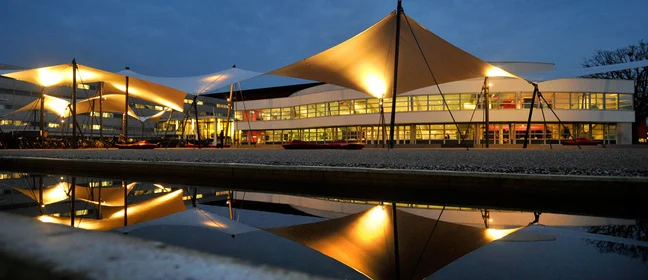The Education System in the Netherlands has a wide range of English- taught programs and dutch universities are world-renowned for high-quality teaching and research. For a small country like the Netherlands, international orientation is important in the field of education and training in our increasingly internationalized world. Moreover, over 95% of the inhabitants speak English and it is easy to blend in socially during your stay.
Respect for each individual’s opinions and convictions is a national virtue that gives strength to the fabric of the Netherlands’ diverse and plural society. This is the foundation of the teaching method used at the Dutch educational institutions.
The education system in the Netherlands focuses on teamwork, creating an ideal environment to make friends.
The teaching style in the Netherlands can be described as interactive and student-centered, providing students with the attention and freedom they need to develop their own opinions and creativity in applying their newly acquired knowledge. By studying in the Netherlands, you will develop an open mind and increase your international orientation.
The Netherlands also has a long tradition of international students. As early as 1950, the Netherlands was the first non – English speaking country to offer programs conducted in English especially designed for foreign students. Gaining a diploma in the Netherlands is the key for a successful worldwide career. The Dutch higher education institutions together offer 1,560 international study programs and courses of which 1,543 are taught entirely in English. This makes the Netherlands the front-runner in continental Europe.
The Dutch system of higher education enjoys a worldwide reputation for high quality. Experience shows that people who have studied at a Dutch higher education institution perform very well in other parts of the world. This quality is achieved through a national system of regulation and quality assurance.

Research Universities in the Netherlands
There are fourteen government-funded research universities in the Netherlands: nine of them offer educations in a broad range of field, three of them specialise in engineering, one in agriculture, and one is an Open University. These educational institutions essentially train students in academic study and research. However, many study programs also have a professional component and most graduates find work outside the research community.
All education programs at research universities in the Netherlands start their first year with the basic courses known as the propedeuse. The propedeuse provide the students with a general introduction to the chosen field, and lays the foundation for the specialized subsequent continuation. As the program progresses, the students receive more freedom to choose their subjects. The final step is the thesis based on the student’s own research.
The universities vary in size, with enrollments ranging from 6,000 to 30,000 students. Altogether they enroll some 205,000 students.
Research Universities used to only offer 6-year educations, and were referred to as ‘academic universities’, or ‘real universities’.
duration of the study programs
• PhD: 4 years
• Master of Arts (MA): 1-2 years
• Master of Science (MSc): 1-2 years
• Bachelor of Arts (BA): 3 years
• Bachelor of Science (BSc): 3 years
Universities of Applied Sciences in the Netherlands
Universities of applied sciences (‘hogescholen’) offer professional programs that focus on the applied arts and sciences. The Netherlands has 40 government-funded universities of applied sciences. The largest enroll 20,000 to 39,000 students. Altogether some 365,000 students are enrolled in professional programs.
Universities of Applied Sciences are more practice-oriented than the universities, offering a variety of full-time and part-time programs in several sectors. All professional programs consist of a foundation phase and a main phase, and end with an individual project and thesis. The essential component of the professional programs is the internship, through which students gain practical experience in real work situations.
Duration of professional programs
• Master (M): 1-2 years
• Bachelor (B): 4 years
Institutes for International Education in the Netherlands
The Netherlands has been offering a form of higher education, called ‘International Education’ (IE,) for more than 50 years. There are many different IE courses and study programs which attract a large number of participants. These courses have gained a reputation even outside the Netherlands’ borders and include courses in management studies, agricultural sciences, astronomy, medicine, civil engineering, remote sensing, and the arts.
The International Education is primarily meant for people at a postgraduate level with some prior professional experience and is well-suited for international students. The pace is intensive at an advanced level and all courses are conducted in English. The programs, which last anywhere from a few weeks to four years, are quite practice-oriented and designed to meet the expectations of students seeking specialized knowledge. Institutes for International Education offer masters programs, but no bachelors programs.
There are five large IE institutes and a number of smaller ones which all focus on development oriented courses. These are based on working in small, intercultural groups and the exchange of knowledge. They are facilitated by teachers with extensive experience in working in developing countries.
Graduate Schools in the Netherlands
Graduate schools are organizations within universities. They provide challenging study and network environments, like the research schools. Some graduate schools are interdisciplinary, other graduate schools focus on just a few or one discipline.
Problem Based Learning System in the Netherlands
The Netherlands has received international acclaim for its ground-breaking Problem Based Learning system, which trains students to analyse and solve practical problems independently.
The Problem Based Learning System places an emphasis on self-study and self-discipline with a large portion of all study programs dedicated to writing papers, working in groups to analyse and solve specific problems, acquiring practical work experience through internships, and conducting experiments in laboratories.

